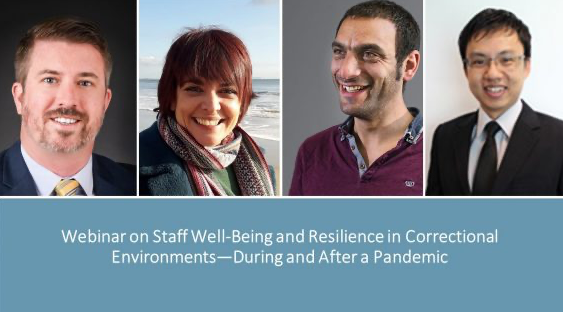
Staff members in correctional facilities navigate a unique blend of challenges and rewards in their work. In the wake of the COVID-19 pandemic, corrections staff well-being must be prioritized and met with effective organizational responses. IACFP recently brought together a panel of experts for the IACFP/ICPA webinar: “Staff Well-Being and Resilience in Correctional Environments – During and After a Pandemic.” Here, we provide highlights from the webinar, including the impact of COVID-19 on staff, operational and mental health measures, coping strategies, and resources.

The Impact of COVID-19 on Staff
Although the work of corrections staff creates high levels of stress, the threat of COVID-19 in prison environments has led to “Pandemic Stress,” says Robin Belcher-Timme, Psy.D., ABPP, CCHP-HM, Vice President & Senior Consultant of Falcon Correctional And Community Services, Inc.
This specific type of stress (linked to a global viral outbreak) has created collective trauma for both staff and inmates, which can include sensations of loss, grief, anger, and confusion. Because of existing layers of baseline stress for those working in corrections, the impact of COVID-19 on staff requires facilities and community corrections organizations to monitor and manage cumulative impacts of stress on staff, which can become toxic if resilience strategies are not implemented.
While pandemic stress must be navigated by anyone in the workforce, corrections staff can be more vulnerable to toxic stress due to higher rates of existing distress. For example, a staff member who has PTSD due to a prior incident must, in the presence of COVID-19, manage their baseline stress, their PTSD stress, and the added influence of pandemic-related stress, which can push them into a state of crisis.
Crisis states, when met with a lack of resilience, can leave staff at higher risk for a range of health-related issues, moral injury and even death. Timme recommends implementing intentional strategies for building staff resilience, including:
- Maintaining routines, promoting confidence, and uniting staff members;
- Watching for signs of distress and establishing clear self-reporting procedures for staff members who desire support;
- Emphasizing the importance of sleep, diet, and exercise;
- Providing guidance on relaxation techniques, such as mindful breathing, calming music, and scheduled breaks.
“I want to connect people up and increase the power of a humanitarian response. I think working together is the key with a collective vision.” ~ Dr. Sarah Lewis, Director, Penal Reform Solutions
Dr. Lewis stated that context matters, and it can change over time. This has been the case for the pandemic. In the beginning, we saw that staff had basic needs that organizations needed to meet. They then experienced sustaining a level of crisis that was both tiring and wearing on staff. Now, staff are needing to make sense of the crisis. As Lewis reviewed a model for growth, she highlighted three areas:
- Proactive resilience, which is being able to plan and prepare for the inevitable challenges of work in corrections;
- Post-traumatic growth and how we create a new normal after collective trauma; and
- Learning through loss.
Operational & Mental Health Measures
Dr. Gabriel Ong, Principal Psychologist & Deputy Director, Psychological Research, Operations, and Programme Design, PCRD, Singapore Prison Service, offered three key operations measures facilities can use to reduce the risk of COVID-19 transmission to prisoners and staff:
- Prevention;
- Detection and isolation; and
- Maintaining social responsibility.
Prevention strategies designed to minimize risk of exposure include eliminating or scaling down non-essential activities, using split shifts to maintain physical distancing, committing to routine cleaning and disinfecting; and ensuring staff wear appropriate personal protective equipment (PPE), including masks.
Detection and isolation measures include instituting controlled entry and compulsory health screenings, closely monitoring staff and inmate health, and segregating new inmates for a minimum of 14 days.
Managing social responsibility means putting measures in place that encourage staff to prioritize their health and well-being, including posted reminders about personal hygiene procedures, enforcement of distancing protocols, and defaulting to telecommute modes of working.
“I think guidance and training around how we sit with uncertainty is important.” ~ Dr. Gabriel Ong
Dr. Ong also highlighted several mental health strategies that can be implemented by facilities to maintain positive mental health outcomes for corrections staff. His recommended strategies included:
- Developing guides focused on mental health and resilience for staff;
- Working with leadership to provide tailored psychological interventions and select a point person to monitor and respond to staff mental health needs; and
- Creating an online platform to share staff-to-staff messages of positivity and support.
Coping Strategies to Carry Forward
The unique challenges of probation work have led to coping strategies that may inform future approaches to crisis situations, believes Dr. Jake Phillips, Reader in Criminology at Sheffield Hallam University in the United Kingdom.
Coping strategies highlighted by Dr. Phillips that can be carried forward for all staff members included:
- Utilizing online “reflective spaces” during lockdown;
- Ensuring staff have office space for video calls wherein they may wish their surroundings to remain anonymous;
- Providing all staff access to a mental health professional, such as a counselor;
- Finding ways to keep staff members connected and accessible to one another via remote work tools like Skype; and
- Allowing greater flexibility in work-life balance for staff members via telecommuting options or alternative delivery methods.
Dr. Ong agrees, “Even if COVID is well under control, the next viral pandemic may be a few cycles away. So, I think it is sensible to adopt some of the changes made during COVID into permanent practice.”
Resources
Both the full recording of the webinar and the slides can be accessed at https://www.myiacfp.org/association-news/. Additional resources related to COVID-19 can be found in the “International News” article.

